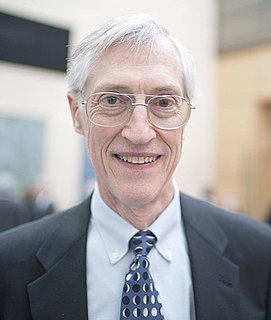A Quote by Fred Hoyle
The big bang theory requires a recent origin of the Universe that openly invites the concept of creation.
Related Quotes
Dilbert: It took weeks but I've calculated a new theory about the origin of the universe. According to my calculations it didn't start with a "Big Bang" at all-it was more of "Phhbwt" sound. You may be wondering about the practical applications of the "Little Phhbwt" theory. Dogbert: I was wondering when you'll go away.
Modern thinking is that time did not start with the big bang, and that there was a multiverse even before the big bang. In the inflation theory, and in string theory, there were universes before our big bang, and that big bangs are happening all the time. Universes are formed when bubbles collide or fission into smaller bubles.
In the popular mind, if Hoyle is remembered it is as the prime mover of the discredited Steady State theory of the universe. "Everybody knows" that the rival Big Bang theory won the battle of the cosmologies, but few (not even astronomers) appreciate that the mathematical formalism of the now-favoured version of Big Bang, called inflation, is identical to Hoyle's version of the Steady State model.
Big bang cosmology is probably as widely believed as has been any theory of the universe in the history of Western civilization. It rests, however, on many untested, and in some cases untestable, assumptions. Indeed, big bang cosmology has become a bandwagon of thought that reflects faith as much as objective truth.
One can imagine that God created the universe at literally any time in the past. On the other hand, if the universe is expanding, there may be physical reasons why there had to be a beginning. One could imagine that God created the universe at the instant of the big bang, or even afterwards in just such a way as to make it look as though there had been a big bang, but it would be meaningless to suppose that it was created before the big bang. An expanding universe does not preclude a creator, but it does place limits on when he might have carried out his job!
The universe starts off with the Big Bang theory, and the first thing that emerged from the Big Bang is essentially hydrogen and then helium. And that's what combusts in stars. Finally, stars implode, and they build heavier elements out of that. And those heavier elements are reconstituted in the heart of other stars, eventually.
Of course, Jastrow's comment is exaggerated at best; theologians hardly predicted the Big Bang. If our universe turns out to be closed, hence with an end, this does not mean apocalyptic visions of the end of the world were on target. And even if a beginning for the universe is a successful prediction of one version of theism, this is still not that impressive. After all, even a stopped clock is right twice a day. The Big Bang becomes strong support for God only with an argument showing that such a beginning requires a Creator.































